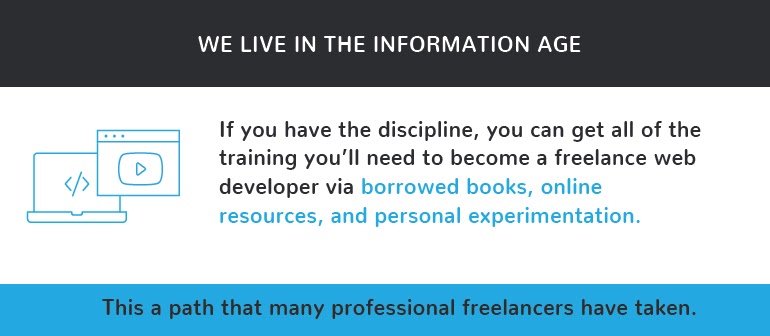Here at DevMountain, we love supporting YouTube channels and other devs that teach code. We are lucky enough to collaborate with YouTuber Quentin Watt on some great content! After students graduate from our program they are faced with the decision to work as a freelancer or work for a company. If you decide freelance work is for you, Quentin put together a great video discussing how much a freelancer should charge. If you prefer to read, we’ve also transcribed his video below!
https://www.youtube.com/watch?v=W2pPFGiQ-J0
How’s it going? It’s Quentin here, and yeah, before I start off this video, I just want to say that this video was sponsored by DevMountain, so check the link in the video description below, and I’ll talk a little bit more about them later on in the video. But for now, let’s get started on the topic that I actually really want to talk about, and this is something that you guys are probably asking yourselves as well. You’re probably wondering, “How can I make money from this new skill that I’m learning from Quentin’s channel? If I’m learning HTML, CSS, JavaScript, PHP, and all these languages of the web, what can I actually do to make money from this, and how much should I be charging people?” I just want to throw out a quick little disclaimer and say that some of the things I’m about to mention here are based completely on prices in and around South Africa, and if you live in a slightly cheaper country, maybe you can make adjustments down to some of these prices.
Maybe if you live in a more expensive country, I’d say you might need to push up your prices a little bit, but the minimum that I see guys charging, and this is actually not even just in South Africa, but around the world, the minimum that I see guys charging for development hours is around $50 per hour of work. Now, the guys who are charging $50 per hour are usually beginners or usually not very good at development, so if you’re really, really good at what you do, then you need to know that you should be charging more, although I’m going to imagine that the guys who are really good at this are probably not watching this video, but as you get better, yeah, you’re probably going to want to push and hike up prices from $50 an hour, and I definitely don’t think that you should be charging any less than $50 an hour. All right?
I think $50 an hour is probably like the minimum you can really get away with, because if you factor all of the other things into account, $50 an hour is really not all that much, because when I say the minimum amount of hours you can charge a client is $50 per hour of work, you still have to take into account that there are hours of your day that you are doing work where you’re not actually doing work that makes money. Right? Think about it. When you get into the office in the morning, you’re probably going to read and check emails. You’re probably going to read and check emails during the day and sometime towards the end of the day as well. All of that time that you’re spending replying and checking emails you’re not actually doing any work that is profitable unless you start charging people for reading an email.
Also, if you’re working in an office environment, or even if you’re a freelancer, and you’re work, meeting with people that are potential business partners or potential clients, you’re probably not charging them for those initial meetings talking about what you could be selling them, so all of that kind of work might be work that will bring in money in future, but they’re not bringing in money at the time that you’re doing it. Right? You have to take all of that stuff into consideration. When you really think about it, even if you’re working for 40 hours a week, so eight hours a day, Monday to Friday, for 40 … Well, yeah, yeah, so basically that works out to 40 hours a day. 40 hours a day, geez. Are you crazy? No, 40 hours a week, so basically that works out to 40 hours a week. Right? Which is kind of the average amount of time that most of us spend at work, and yeah.
If you take into account those 40 hours, you’re probably going to lose at least two to four hours of your day doing things that don’t actually make money. Reading those emails, having those meetings, meeting your colleagues, and those kinds of things. Right? Then your $50 an hour doesn’t add up to all that much, so it’s probably best to just consider us talking about project hours, and I think project hours are, obviously, the amount of hours that you spend working on one project at a time, doing stuff for that specific project. Now, I find that even if you’re going to be getting in a really simple project, so let’s say you have a client that comes up to you and says, “Hey, I want a four-page website, so homepage, about us page, contact us, and a page about services,” so they only want four pages.
You’re probably going to find that you’re going to land up spending at least a minimum of about 20 hours on the project, and also when I say 20 hours, I don’t mean like, “Okay, if you start working on the project right now this afternoon, tomorrow more or less this time you’re going to be done.” This is going to be 20 hours of a period of at least a week or two. Typically, I think it’s going to be at least two weeks minimum, even on a simple WordPress site. Let’s say all you’re doing is downloading the WordPress, downloading WordPress, installing a theme, and using CSS to change and match some colors and add in some content. I think …
You might think to yourself like, “Oh, it’s actually going to cost,” or, “It’s going to amount to much less than 20 hours,” and then the problem is, there’s always going to be that back and forth with the client, so you’re going to send that stuff over to the client. The client’s going to look at it. They’re more than likely going to ask you to make the logo bigger, change some text, move an image, all of these kinds of requests. Right? You’re always going to have some back and forth with the client. At the end of the day, when you look at all of that work and how much, how long it’s taken you, you land up spending at least 20 hours or more on the project, so it’s a good thing to just keep track of how much time you’re actually spending on somebody.
Basically what I’m saying here is, for a really simple project, if you’re charging $50 an hour for 20 hours to actually do that project, you can make $1,000 for a really simple website at $50 an hour, but like I said, I wouldn’t really charge any less than that, because you’re probably going to land up not making enough money to cover certain basic costs like rent for an apartment and other things, but again, in future, you’re probably going to land up getting more complicated jobs, and so if you’re getting a more complicated job, that’s going to take longer to do, so you kind of need to factor that in. Then, yeah, I think the better you get at this, and the more professional you are at the work you’re doing, then don’t bother about trying to beat somebody’s hourly rate. Right?
You should know yourself that if you can get, if your quality of the, the quality of your work is just much, much better than other people’s quality of their work, it should be okay to start raising that price to $100 an hour or $150 an hour. To put things into perspective, I think the average dev cost for companies in and around the area that I work in in Johannesburg is about $75 an hour for like fairly cheap work, and then the more complicated stuff you want, the more complicated or the higher the price for dev actually goes, and we land up actually charging around $150 an hour to $200 an hour for certain projects, and some of the more complicated projects that we actually have to handle can sometimes take between two to three months to actually complete. In fact, we’ve worked on projects that take six months to a year to even complete.
Just, it’s really important to know how much you’re actually charging per hour and how much money you’d actually like to make back, what your expenses actually are, so be informed about your rent. Be informed about how much money you should be putting away for retirement one day when you’re old, how much money you need for medical care right now, and all of that. Take all of that into account, and then decide from there how much money you should be charging people, but I definitely don’t think anything less than $50 an hour if you’re a beginner. The more professional or the better you get, start looking at your pricing and upping it to something a little bit higher. If you consider yourself a beginner right now, don’t go around charging people less than $50 an hour, but if you want to get to that point where you can charge somebody a higher price, like 200 to $300 an hour, then you kind of need to make sure that you are well informed and you are good at what you do.
One way to do that really quickly is to take a boot camp and learn some languages from a really professional school, so go ahead and check out DevMountain’s website. The link is going to be in the video description below. They’ll teach you everything that you need to know to become a web developer, an iOS developer, or a UX designer, and they’ll do it within 12 weeks, which, yeah, is pretty amazing, actually. I know a lot of guys have actually got back to me and said, “Well, 12 weeks is a long way, a long time to go unpaid.” DevMountain has actually spoken to me over the past couple weeks, and they let me know that they’re actually doing online courses now as well, so if you’re trying to do a course but you don’t actually want to quit your job or something, they do have part-time classes, part-time courses available, and online courses as well, so go ahead and just ask them about those. If you do contact them, make sure to tell them that Quentin sent you.
That’s all I have for you guys in this video, so don’t forget to subscribe. Please feel free to leave a comment, like, and share this video, because all of that is going to help my channel grow, and I’ll see you guys next time.







